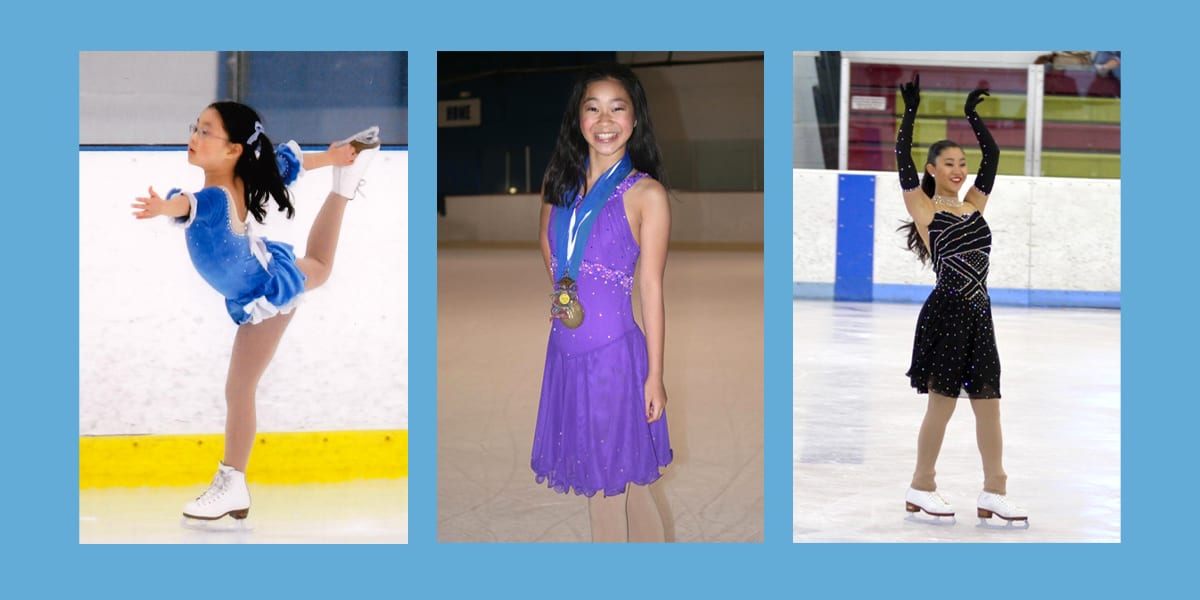“I’m going to be the next Michelle Kwan.”
As a child with high hopes and far-fetched dreams, the Olympics landed on my radar as soon as I stepped foot on the ice at the age of 6. Upon hearing the words “you’ve got talent” after one lesson from Learn to Skate at my local New Jersey rink, I did some mental math and became convinced that the Olympics were in the cards.
By age 9, the rink had become my second home and the place where I felt most alive. The second my blade hit the ice, all thoughts and emotions immediately melted away.
Of course, no one took me seriously. My parents signed me up for group figure skating classes to keep me busy and entertained, but they didn’t expect my childhood fantasy to become a 12-year-long commitment.
But group classes turned into private lessons, and I became heavily invested in the sport. After a winning streak at local competitions and learning how to land an axel in three months (a feat that typically takes six months to two years), my parents realized that skating really was something in which I had a future.
I was more than happy to revolve my life around skating. By age 9, the rink had become my second home and the place where I felt most alive. The second my blade hit the ice, all thoughts and emotions immediately melted away and I was transported into a new dimension. The sport served as a physical and emotional sanctuary, providing solace during every stage of my early life. I often felt that skating was more natural than walking, and my friends laughed at the irony of my grace on ice given my clumsiness on land.
Before I knew it, I was at the rink for 15-plus hours a week with a jump specialist, a spin coach, an edge technician, a choreographer, a personal trainer and a physical therapist. In addition, I took ballet, flexibility and conditioning classes that pushed me to my mental and physical limits and forced my growing body to endure significant strain.
In addition to traditional freestyle skating, I picked up solo ice dancing at age 12, which focused on edges, footwork and artistry. This immediately caused my schedule to intensify. My weekends consisted of doing homework in the car during three-hour round-trip commutes to practice since my coaches were located in different parts of the state. On weekdays, I would sometimes be up at 5 a.m. for morning practice before school, and then head straight to the rink right after school.
I juggled both freestyle and ice dance for some time, convinced that I had a future in both disciplines. But this balancing act ended up hindering my progress, and I eventually decided to focus on the latter as it became evident that I was much more successful as a dancer.
I excelled at U.S. National Solo Dance, a competitive series for ice dancers without a partner. However, I yearned for more than the national titles I achieved. I desperately wanted to skate with a partner, as it would allow me to travel internationally and potentially compete in the Olympics. My parents even looked into acquiring Taiwanese dual citizenship to give me an additional leg up by representing a less competitive country.
I had a few partner tryouts and absolutely loved dancing as a team, but I hesitated to commit to a pairing. My grueling practice schedule had become extremely detrimental to my mental and physical health since reaching high school the year before. I had a rigorous course load, I faced chronic injuries and exhaustion, I hated following a diet, and I was forced to sacrifice much of my social life. Missing out on social outings had become a painful norm, and I was constantly envious as my friends hung out every day and spent their weekends relaxing and partying like regular teens.
But I also watched my competitors with envy, as many girls followed the path of partnered skating and advanced in the world of international ice dance. Seeing their names on my television screen exacerbated my pain, as I knew I was capable of being in that position and experiencing the same glory.
I also faced a constant stream of contradictory pressures from those closest to me: My coaches wanted me to consider homeschooling, my parents lamented the exorbitant cost of lessons, my friends implored me to quit altogether. I was constantly in a state of inner turmoil, struggling to decide whether I should follow my athletic dreams or live my life as a normal teenager. I couldn’t keep straddling both worlds — it was one or the other.
I ended up choosing not to pursue partnered dance. Though I continued skating, my priorities shifted. My passion for the sport dwindled further as I fell victim to athlete burnout, in which the lifestyle of competing felt more like a burden than a thrill. The Olympic dream began to slip further away, and I started to focus more on my schoolwork and my friends.
I may not have become the next Michelle Kwan, but I have achieved goals in other parts of my life that wouldn’t have been possible if I agreed to sell my soul to my sport. I became a skating coach and judge. I served as a Girl Scout ambassador and received a gold award for my community service. And I developed a passion for writing that led me to launch an international award-winning blog.
I will be forever grateful for the indelible memories and the valuable life lessons that skating gave me, but choosing not to pursue the sport on an Olympic level was the best decision for my personal growth, mental health and academic future.
Still, as the 2022 Winter Olympics begin to air with Friday’s opening ceremony, it would be disingenuous if I didn’t admit that I do sometimes lament the path not traveled, and I can’t shake a degree of regret knowing that I failed to achieve my childhood dream.
Though I do reminisce about my glory days as an athlete, I now relish in the luxury of sleeping past noon, eating whatever my heart desires and spending my free time with friends.
Of course, I never actually qualified for the Olympics, and it’s bold to assume that I would have made it that far. But I feel a twinge of sadness knowing that this life was once within reach. The next two weeks will certainly be a melting pot of emotions as the Olympic Games trigger my nostalgia and remind me that I am no longer a competitor, just a spectator.
At the same time, the Olympics serve to validate my decisions. Though I do reminisce about my glory days as an athlete, I now relish in the luxury of sleeping past noon, eating whatever my heart desires and spending my free time with friends. I used to be wracked with guilt whenever I indulged in one of these things, so my current lifestyle is nothing but bliss.
The 2022 Winter Olympics will consist of me cozying up stress-free in my college apartment, reconnecting with my beloved sport and sharing pieces of my past life with my newfound friends. Skating will always be part of my identity, and it’s nice to finally have my cake and eat it, too.
Source: | This article originally belongs to Nbcnews.com











